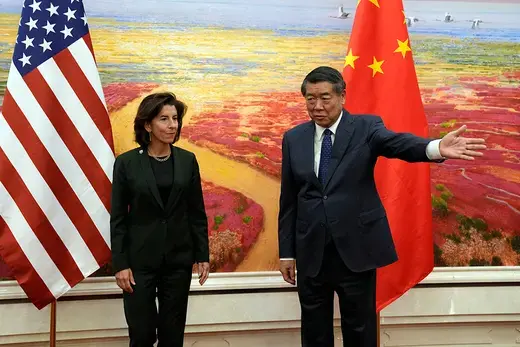President Biden Has Banned Some U.S. Investment in China. Here’s What to Know.
The Joe Biden administration says the restrictions are directed at protecting national security, not stifling economic competition.
By experts and staff
- Published
By
- Noah BermanWriter/Editor, Economics
A new executive order restricts U.S. investments in sensitive technologies that Washington fears could help Beijing increase its military power. It is the latest in a raft of policies erecting barriers between the world’s two largest economies, and U.S. allies could soon adopt similar measures. Amid China’s economic downturn and mounting U.S. concern over protecting these technologies, Commerce Secretary Gina Raimondo went to Beijing in August to seek a path forward.
What are the new restrictions?
The executive order, signed by President Joe Biden earlier in August, restricts outbound investment to China, Hong Kong, and Macau in areas deemed critical to U.S. national security. These include three main industries: advanced computing chips and microelectronics, quantum technology, and artificial intelligence (AI). In some cases, especially regarding technology destined for military or surveillance purposes, investment is prohibited outright, while for less sensitive products, it is permitted with government notification.
The order specifically targets investments that risk transferring “intangible benefits” such as managerial expertise, talent networks, and market access. It does not target less involved investment in publicly traded securities such as stocks or bonds. The Treasury Department, which will implement the restrictions, said they are intended to apply only to transactions made after the order goes into effect in 2024; in the meantime, experts say, negotiations with industry could lead to some of them being walked back.
Why is the United States targeting outbound investment into China?
The new restrictions come after years of growing concern over China’s acquisition of advanced technologies. The Donald Trump administration introduced an unprecedented $360 billion in tariffs on Chinese products, and Biden followed up with export controls that experts said were aimed at “strangling” the Chinese technology industry. The Biden administration has also discouraged allies from selling chips to China. In March 2023, the Netherlands, home to the technology used to make the most advanced chips, announced its own export control regime; Japan, which supplies half of global semiconductor materials, followed suit weeks later.
Now, U.S. policymakers are increasingly worried about China’s growing military power. Analysts have long warned that China’s Communist Party pressures foreign investors to share intellectual property. “Dual-use” technologies, which serve both commercial and military needs, bring particular danger. “It’s the blurred nature between private- and state-owned, between civilian use and commercial use versus military use, that increases risk from American policymakers’ perspective,” says CFR’s Maurice R. Greenberg fellow for China Studies, Zongyuan Zoe Liu. These concerns led Biden to declare a national emergency alongside the executive order, citing “an unusual and extraordinary threat to the national security of the United States” in a letter to Congress.
The Biden administration has stressed that it intends to narrowly tailor restrictions to prevent China’s military advancement and protect U.S. national security, not cause China economic harm. Biden administration officials call this strategy “de-risking,” as opposed to “decoupling,” or the wider separation of the U.S. and Chinese economies.
How is China responding?
China’s foreign ministry called the controls “technological bullying,” but Beijing is yet to retaliate. Responding to previous U.S. restrictions, China blocked mergers between Chinese and U.S. semiconductor firms, banned U.S. chipmaker Micron Technology from certain infrastructure projects, and restricted exports of critical minerals used in advanced chips.
However, as China confronts an economic downturn, some experts say its options for retaliation could be limited. “Beijing has few options to respond to the new U.S. actions without inflicting collateral damage on its own economy,” writes Paul Haenle, the Maurice R. Greenberg director’s chair at the Carnegie Endowment for International Peace.

Meanwhile, scheduled diplomacy between the countries continues. Weeks after Biden announced the restrictions, Commerce Secretary Raimondo met with Chinese officials in Beijing. On the trip, Raimondo said there was “no room” to negotiate on national security, but argued that the U.S.-China trade relationship could hold the keys to political stability. In addition to those talks, Chinese President Xi Jinping could meet with Biden in November at the Asia-Pacific Economic Cooperation (APEC) Leaders’ Summit in San Francisco, U.S. policymakers say.
How are U.S. allies responding?
Biden reportedly discussed his plans with other Group of Seven (G7) leaders at the group’s May summit in Hiroshima, Japan, though they are yet to announce similar restrictions. However, Germany, the United Kingdom, and the European Union (EU) are all said to be considering their own outbound screening regimes. In June, the European Commission announced it would propose such measures by the end of 2023. That would come amid ongoing change in the European outlook toward Chinese investment; for years the EU sought a close economic relationship with Beijing, including by pursuing a now-defunct EU-China investment deal, but it has since officially embraced de-risking.
Are more restrictions coming?
Biden administration officials speak of maintaining a “small yard with a high fence” when it comes to protecting technologies critical to U.S. national security. Still, lawmakers are signaling an appetite to expand the restrictions’ ambit. Some have proposed broadening outbound investment screening to include industries such as advanced aviation, biotechnology, and energy, and additional countries, such as Cuba, Iran, North Korea, Russia, and Venezuela. Others go further, calling for a more complete decoupling. Meanwhile, some skeptics argue that by eliminating access to foreign know-how, these restrictions could accelerate China’s self-sufficiency in developing its critical technology sector.
Many experts say that an overly broad screening regime would harm U.S. interests and skew toward unnecessarily protectionist policies. “As long as that yard remains small and focused on the critical national security technologies, I think we’re on very firm ground,” CFR President Mike Froman said on CNBC.